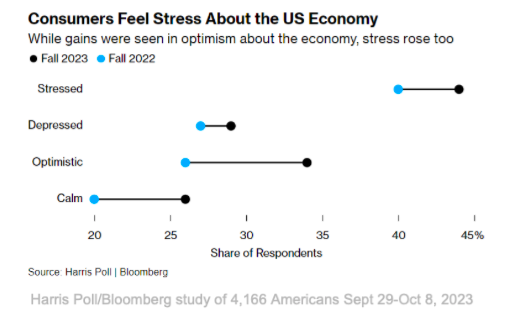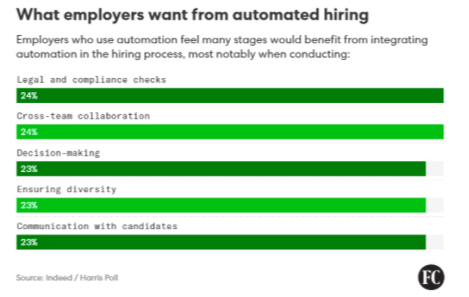Brief • 4 min Read
America This Week: A Rattled Middle Class, Downvoting AI Hiring, Seniors Love Them Some Health Tech and Social Storefronts Are On Trend This Holiday.
The latest trends in society and culture from The Harris Poll
Three weeks without a Speaker of the House, the second longest time that Congress had been without one (back to 1962), did nothing to diminish American worry about political divisiveness in the country. According to our America This Week poll, fielded October 27th to 29th, among 2,112 Americans, (75%) remained concerned about political divisiveness in the country (-1%-pt from Sept. 22), with (39%) being very concerned. Something both parties are cognizant of (Democrats: 82%, Republicans: 72%).
This week, four new Harris Polls of note: In the third installment of our exceptional tracking of America’s Middle Class with Bloomberg, rising borrowing costs are proving as damaging as rising consumer prices. Also, a new Harris study with Indeed finds that AI HR hiring tools are offputting to older candidates. Next, with Elevance Health, we see the opposite! Older Americans like their health tech. And lastly, with the holiday shopping season fast approaching, more consumers are utilizing social storefronts in a new Harris/Nogin study.
Fed’s Fight Against Inflation Rattles Middle-Class Americans: Bloomberg-Harris Poll
In our third installment on The Middle Class with Bloomberg, we find that despite roaring growth and a resilient job market, more middle-class Americans are worried about the state of the economy than a year ago. Here’s what else is on their minds:
- Finances aren’t changing for the better: 6 in 10 (61%) middle-class Americans said their personal financial situation was worse or unchanged from a year ago. Only (12%) said they were in a “much better” circumstance.
- Three-quarters also say they are paying more and more for goods and services, and two-thirds said higher prices for household essentials are hurting them financially.
- And over half (57%) reported higher borrowing costs were hurting their household finances.
- These strains contributed to downbeat sentiment about pocketbook issues: Some (44%) said they were stressed about the economy, up from (40%) a year ago and (39%) in March.

Takeaway: Economists aren’t sitting at kitchen tables with middle-class Americans. For most, their paychecks are still chasing their bills, and they feel they’re falling further and further behind. And even rising wages aren’t enough, as (63%) report that stagnant wages also hurt their finances and (42%) that their costs are rising faster than their wages.
Older Americans Downvote AI Hiring: Indeed-Harris Poll
With record numbers of retiring Boomers causing a labor shortfall, our new poll with Indeed in Fast Company finds hiring managers are likely alienating older job applicants with their automated HR tools.
- Employers are leaning into AI for hiring help: (87%) of employers surveyed said they view automated hiring positively, with almost half of large employers saying they consider it a positive.

- The majority (54%) of job seekers or recent job switchers say they feel “valued” by some degree of hiring automation (e.g., regular updates about the status of their application, faster responses to inquiries, etc.)
- Yet older workers bristle at AI: (71%) of those 18 to 35 said using automation made them feel more valued vs. only (43%) of those 36 and older.
- A similar variation exists in automation’s impact on company perception: (55%) of younger job seekers said automated hiring processes make a company appear more innovative, versus only (33%) of older users.
- But watch out for bias: Nearly half of all employed U.S. job seekers (49%) believe AI tools used in job recruiting are more biased than their human counterparts, in a separate Harris/American Staffing Association Workforce Monitor survey.
Takeaway: Older job applicants can remember when hiring was a human-driven affair. So, what should still involve human interaction? Communication updates, interview scheduling, and networking assistance topped the list. Hiring managers should blend AI with relationship building since (84%) of U.S. employees say it’s a significant loss when older employees retire without passing on their years of knowledge to younger employees – a “brain drain.”
Older Americans Love Them Some Health Tech: Elevance Health-Harris Poll
While older Americans may question AI hiring, many want the ability to utilize more digital methods in managing their health, according to our poll with Elevance Health in Fierce Healthcare.
- Seniors are happy with their virtual healthcare: The majority (89%) of adults 65 and older who have used virtual primary care for any healthcare need have been satisfied with their experience.
- In addition, (78%) of those 65+ agree that virtual primary care can be a great way to increase access to healthcare for people who may otherwise be unable to visit a provider in person.
- And four in ten (40%) 65+ are likely to use virtual primary care in addition to the care they receive from their current health provider in the next five years.
Takeaway: “Older adults are adopting digital health tools at a higher rate than ever before. This adoption has considerable potential to support these individuals in accessing healthcare, helping them maintain their autonomy and independence as they age, as well as promoting their health and well-being” (Fierce Healthcare).
Social Storefronts Are The New Trend This Holiday Season: Nogin-Harris Poll
As we enter the holiday season, Americans are ready to shop. Despite a janky economy, (37%) of holiday shoppers plan to spend more on holiday gifts than last year in a new webinar Harris Poll CEO John Gerzema conducted recently with The OAAA. Interestingly, more purchases are coming directly from social media advertising this season, according to our recent Harris Poll research with Nogin.
- Social media is the new storefront: 7 in 10 (70%) online shoppers say they’ve made purchases directly through social media ads – including more than half (56%) of online shoppers aged 65+.
- And they expect to keep doing it: (29%) of those who make purchases through social media ads say they are making more purchases that way this year than they did last year.
- Social media advertising as a channel is valued for convenience, personalization, and incentives, especially for younger audiences: Younger online shoppers are more likely to be influenced by personalized recommendations than their older counterparts (18-44: 22% v. 45+: 12%).
- And incentives: Free shipping (81%) and discounts (68%) top the list of things online shoppers say would inspire them to purchase online.
Takeaway: “As we approach the holiday season, the data underscores the need for retailers to provide online consumers with the right mix of incentives and personalized experiences,” says Jonathan Huberman, CEO at Nogin. “For D2C brands, this translates to a golden opportunity: optimizing their e-commerce approach using intelligent, AI-driven strategies that cater to individual shopper preferences. By doing so, they can not only boost sales but also cultivate enduring customer relationships that thrive well beyond the holiday frenzy.”
Subscribe for more Insights
Subscribe to our newsletter for the latest trends in business, politics, culture, and more.
Download the Data
This survey was conducted online within the U.S. by The Harris Poll from October 27th to 29th among a nationally representative sample of 2,112 U.S. adults.
Download
Subscribe for more Insights
Subscribe to our newsletter for the latest trends in business, politics, culture, and more.
Download the Data
This survey was conducted online within the U.S. by The Harris Poll from October 27th to 29th among a nationally representative sample of 2,112 U.S. adults.
DownloadRelated Content








